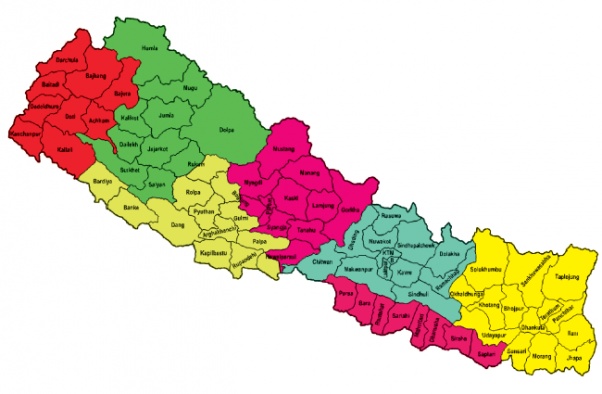Where is federalism heading?
 Narayan Prasad Ghimire / Kathmandu: The constitution amendment bill has been stuck at the Legislature-Parliament for the past two weeks. The major opposition, CPN-UML, along with some fringe parties, have been obstructing the parliament business arguing that the bill has jeopardized the geographical unity and integrity by hiving off some hill districts from the province No 5, and by making easy provisions on acquisition of naturalized citizenship. Not only in the parliament, the UML also flared up its protest against the amendment process by taking people to the street in the concerned districts of province no 5. The banda (general strike) has been taking toll on the daily lives of the people and caused severe dent on economic activities.
Narayan Prasad Ghimire / Kathmandu: The constitution amendment bill has been stuck at the Legislature-Parliament for the past two weeks. The major opposition, CPN-UML, along with some fringe parties, have been obstructing the parliament business arguing that the bill has jeopardized the geographical unity and integrity by hiving off some hill districts from the province No 5, and by making easy provisions on acquisition of naturalized citizenship. Not only in the parliament, the UML also flared up its protest against the amendment process by taking people to the street in the concerned districts of province no 5. The banda (general strike) has been taking toll on the daily lives of the people and caused severe dent on economic activities.
To the stupefaction of the ruling Nepali Congress and the CPN (Maoist Centre), a group of leaders from these parties joined the UML-led protest programmes in Butwal city igniting the objection to constitution amendment. It means the political leaders from province No 5 are not satisfied with the sudden decision to split the province.
At a time when the government has asserted that the constitution was being amended to ensure its broader acceptability, especially meeting the demands of the Madhes, the Madhesi political parties themselves are divided on the amendment proposal. Sadbhavana Party led by Rajendra Mahato has said it would accept the amendment while the Federal Socialist Forum Nepal led by Upendra Yadav has flatly rejected the idea, saying it still had not encompassed the aspirations of Madhes. During an interview to TV on Friday, Yadav was arguing that the amendment bill was unscientific and impractical, while suggesting major political parties to remove the provision of ‘naturalized citizenship’ in the country.
Interestingly, being much beleaguered with the government’s efforts of constitution amendment, Chairman of the major opposition UML, KP Sharma Oli, has even floated the idea of the changing the existing five development regions into the five provinces. Some days back, Vice-chairman Bam Dev Gautam had also regretted saying, “Federalism is likely to bring further conflict, while we had expected that it would resolve conflict in the country.”
Such views from the political parties clearly indicate that there is huge difference among the political parties and leaders themselves on the perception of the federalism. Lack of common understanding on federalism among all political parties is therefore a major obstruction on implementation of federalism.
In this connection, what is worth mentioning is- the idea of integrated region has emerged again after the political parties tried to split province No 5. Such as the demands of ‘integrated east’ regarding three districts- Jhapa, Morang, Sunsari and ‘integrated far-west’ regarding the districts-Banke, Bardia, Kailali, Kanchanpur. With much ruckus and obduracy of some political parties and leaders, the idea against integrated east and far west remained intact.
So far, political parties’ differing views on provinces from time to time suggest that rigorous study and preparations for this system is not done, it is rather forwarded in an emotive and whimsical manner. Some parties like the one led by Upendra Yadav is saying that the report of the State Structuring Commission on delineation of province should be followed. The UML and the Maoist party had once mooted for up to 12 provinces, which got severe censure by the Nepali Congress on the ground of capacity that country could not economically sustain such a lot of provinces.
With this in the background, many intellectuals are even suggesting parties reconsidering federalism or putting it on hold for 10 years. As some sections in the country are crying for the recognition to their identity, culture and language, and seeing federalism as the cure, while some are arguing that breaking interdependence in terms of social and economic relations among people from hills and southern plains would divide country. Hence, the eluding consensus among the political parties on the pressing issue of federalism is likely to be a prolonging debate for the country, taking toll on development.
Senior journalist Dev Prakash Tripathi observes the recent development, “Firstly, political parties themselves are not clear on federalism. Secondly, federalism is being implemented in an artificial manner. So, federalism can’t sustain, but push the country into vicious cycle of conflict and chaos.”
Conclusively, all political parties must come to a common stand on federalism at the earliest. Their persuasion to the people-voters-is significant how the national politics and state affairs move ahead. If the issue of federalism is being made a party-specific agenda for coming elections, it would undoubtedly bring further confrontation. RSS
